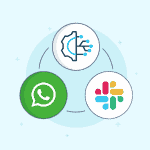Managing customers, following them during the initial stages of a company is not that difficult. However, by giving more and more space to business growth and development, it will gain a greater market share, by increasing the level of demand regarding user control.
So much so that companies often need to periodically hire new agents for customer assistance and follow-up. This is a critical task because most sales will be closed as a result of excellent management and follow-up by the staff.
This is why at Callbell we wanted to design a very interesting strategy and features to allow the automation of customer follow-up, using our tool.
In this article, we want to talk to you about how to do all this using only Callbell.
We know very well that not all leads buy or are easy to convince and take to the final stage. And this is precisely the moment in which we must develop strategies to apply to convince our potential customers both in the short and long term, by carrying out periodic and constant control and monitoring depending on its status.
It is indisputable that followed-up leads have a higher conversion rate than those who are not followed-up. This means cultivating that customer so that in the future he can become a real regular customer of our company.
Automating the follow-up of potential customers is a function that can be performed via Callbell using two different ways, but today we will only describe one of them.
The two ways to do this are as follows:
- Sales funnels to automate follow-up (we will explain this later)
- Chatbot to automate services and follow-up.
That is exactly how it is: Callbell presents two ways to automate customer follow-up, giving chatbot and sales funnels as options. In this article we decided to describe funnels and how to follow your customers almost automatically.
In order to achieve this goal, you will have to carry out several steps that we will show you below, always with commitment and planning.
1. The first thing to do is create a Callbell account.
In order to create your Callbell account just click here.
2. Now you will need to add your agents to the account and your social profiles.
This is done to configure your account and receive messages directly from social networks and manage them in an extremely simple way.
3. Let’s go to the setup – conversation funnel

We enter the funnel section and create our tags with which we can track all potential customers.

4. Once this is done, all that is left is receiving and following up with our customers.

This means tagging customers who initiate a conversation with our company, including those who need follow-up.ù
5. Set alarms and begin follow-up.

Once you have tagged the customers who need follow-up, you will need to set alarms for each of them; for example, a small note about their needs. In this way, every time a customer wants a follow-up, the alarm will sound and we will be able to identify the customer thanks to the tag set previously.
In this way, every time a customer needs action, the alarm we set will warn us and tell us who needs to be helped so as not to confuse contacts at each stage of the funnel.
Callbell can track and serve your customers
Always keep in mind that with Callbell you have the possibility to carry out all the follow-ups you want in a semi-automatic way, managing contacts in a multi-agent and multi-channel way.
If you would like to try Callbell and perform excellent follow-up of your customers, click here.
About the author: Hello! I am Alan and I am the marketing manager at Callbell, the first communication platform designed to help sales and support teams to collaborate and communicate with customers through direct messaging applications such as WhatsApp, Messenger, Telegram and Instagram Direct




